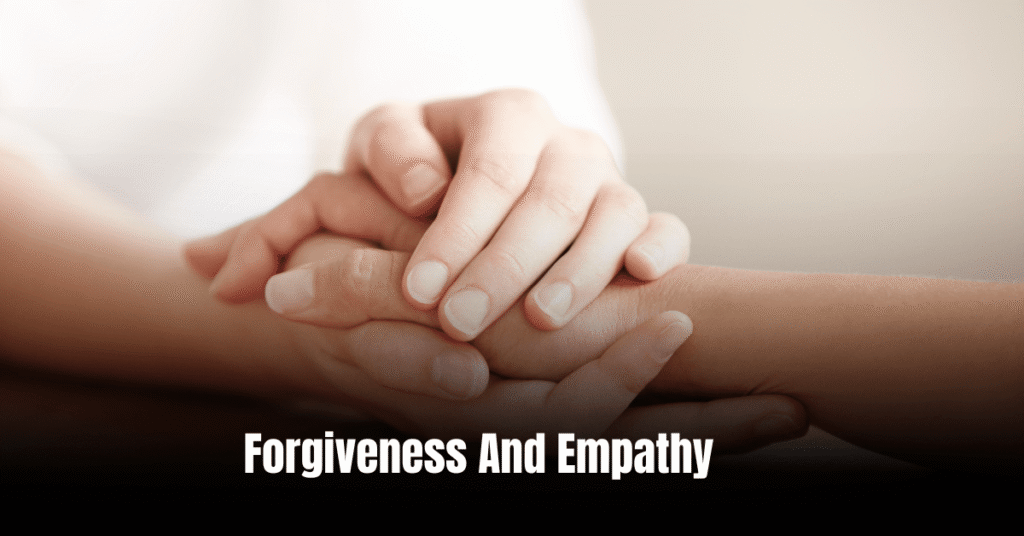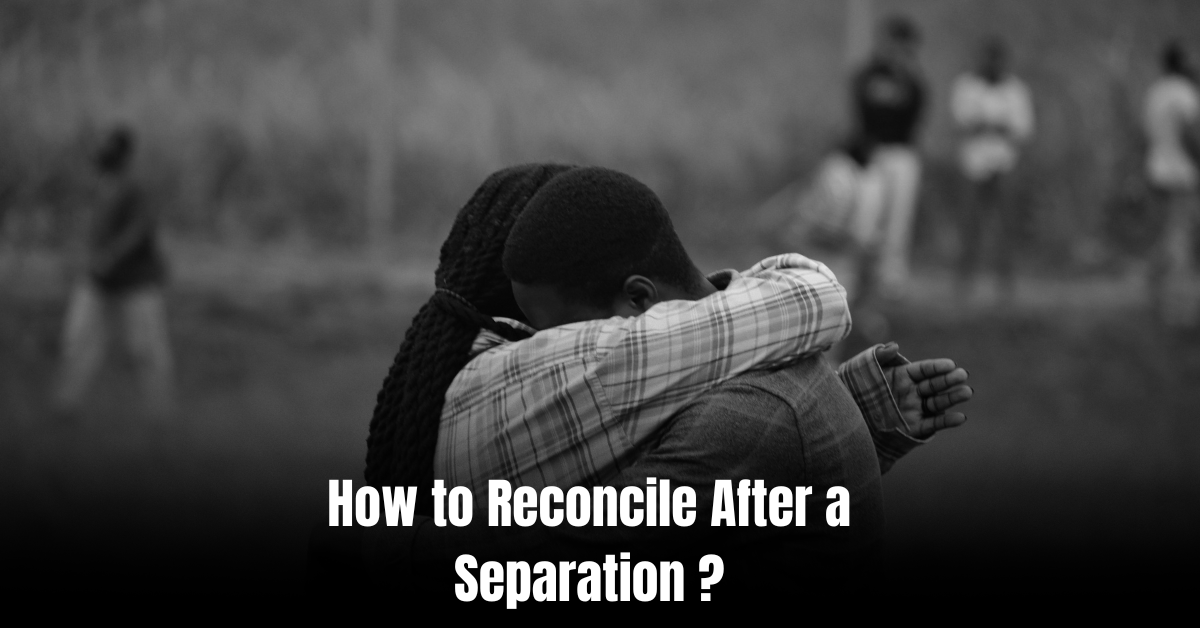Reconciling after a separation can be achieved through effective communication and seeking professional guidance if needed. Rebuilding and reconnecting after a separation is a challenging and delicate process.
Whether you and your partner have taken a break due to differences or external circumstances, finding a way back to each other requires patience, understanding, and active effort. While it may seem insurmountable at times, there are steps you can take to reconcile and rebuild your relationship.
This article explores the practical ways to mend a broken bond and reignite the love you once shared. By focusing on effective communication and seeking professional guidance if needed, you can pave the way for a successful reconciliation and a stronger future together. So, let’s dive in and discover the path to reconciling after a separation.
The Emotional Toll Of Separation
The emotional toll of separation can have a profound impact on mental health. When going through a separation, individuals may experience a range of overwhelming emotions such as grief, anger, sadness, and anxiety. It is essential to acknowledge and validate these emotions, allowing oneself to process and heal. Psychological support through therapy or counseling can be crucial in navigating the complexities of separation and dealing with the emotional aftermath. Seeking help from professionals can provide individuals with coping strategies and tools to manage their emotions effectively. Additionally, engaging in self-care practices like exercise, meditation, and journaling can also help in reducing stress and improving mental well-being. Taking time to heal and prioritize self-care is essential in the journey towards reconciliation after a separation.
Addressing The Reasons For Separation
Addressing the reasons for separation is crucial to reconciliation after a separation. It is essential to identify and acknowledge the issues that led to the breakdown of the relationship. This requires open and honest communication between both parties involved. Both partners should be willing to listen and understand each other’s perspectives without getting defensive or judgmental. It is essential to create a safe space where both partners feel comfortable expressing their thoughts and feelings. This can be achieved by setting ground rules for how discussions will take place, such as using “I” statements instead of blaming each other. By understanding the underlying issues and working together to find solutions, couples can begin the process of reconciliation and rebuilding their relationship.

Developing A Shared Vision For The Future
Developing a shared vision for the future is essential in reconciling after a separation. This involves defining individual and shared goals that both partners can work towards. By openly discussing and identifying these goals, couples can gain clarity on what they want to achieve individually and as a couple.
Once goals are established, it is essential to create a framework for compromise and growth. This means finding common ground and making mutually beneficial decisions that align with both partners’ desires and values. It requires open and honest communication to ensure that each person’s needs and wants are understood and respected.
In addition, the process of reconciling after a separation is a journey that requires patience and understanding. It is crucial to prioritize forgiveness and let go of past grievances to move forward together.
Seeking Professional Guidance
One important aspect of reconciling after a separation is seeking professional guidance through couples therapy. Couples therapy provides a safe and neutral space for both individuals to express their feelings, concerns, and desires in a controlled environment. It offers an opportunity for each person to understand their own patterns of behavior and communication, as well as their partner’s, to work towards rebuilding trust and enhancing the relationship.
When considering couples therapy, it is crucial to find a qualified therapist who has experience and expertise in working with couples. Look for someone who specializes in relationship issues and has a track record of helping couples overcome challenges and strengthen their bond. Reaching out to friends, family, or trusted professionals for recommendations can be a great starting point in finding a therapist who suits your needs.
Through couples therapy, couples can learn effective communication strategies, develop empathy and understanding, and acquire tools to navigate conflicts in a healthy manner. With the guidance of a qualified therapist, couples can work together towards reconciliation and ultimately rebuild a stronger and more fulfilling relationship.
Processing Emotions In A Healthy Way
In the process of reconciling after a separation, it is crucial to handle our emotions healthily. Self-reflection is a powerful tool that can aid us in this journey. It allows us to delve deep within ourselves, examining our feelings, thoughts, and actions. By being honest with ourselves and acknowledging our role in the separation, we can begin to heal and grow. Self-reflection also helps us gain clarity on what we truly want and need from a relationship, enabling us to make better choices moving forward.
Another critical aspect of reconciling after a separation is practicing self-care. This involves taking care of our physical, emotional, and mental well-being. Engaging in activities that bring us joy, nourishing our bodies with healthy food and regular exercise, seeking support from loved ones, and practicing relaxation techniques can all contribute to our overall well-being. Prioritizing self-care allows us to build resilience and strength, helping us navigate the challenging process of reconciliation.
Cultivating Forgiveness And Empathy
Reconciling after a separation can be a challenging journey, but it is possible to rebuild a strong and healthy relationship. Cultivating forgiveness and empathy is crucial in this process. While it may be difficult, letting go of resentment is essential for healing and moving forward. This involves acknowledging and understanding your partner’s perspective, even if it differs from your own. By putting yourself in their shoes and considering their emotions, you can foster empathy and compassion. Communication plays a vital role in reconciliation as well. Openly expressing your feelings, concerns, and desires while actively listening to your partner can help facilitate understanding and promote healing. It is essential to be patient with each other and give yourselves time to heal and grow. Through mutual effort and a commitment to change, you can rebuild a stronger and more resilient relationship.

Reestablishing Emotional Connection
One important aspect of reconciling after a separation is reconnecting through shared experiences. Engaging in activities or hobbies together can help create new memories and strengthen the emotional bond. It is crucial to make an effort to spend quality time with your partner and participate in activities that you both enjoy.
Effective communication plays a vital role in rebuilding a relationship. Expressing love and appreciation for your partner can help reignite the emotional connection. Simple gestures such as verbal affirmations, written notes, or acts of kindness can go a long way in showing your affection and gratitude.
Transparency And Accountability
Transparency and accountability
Rebuilding trust after a separation requires a strong commitment to transparency and accountability. This means being open and honest about your feelings, intentions, and actions. Transparency is essential for demonstrating sincerity and rebuilding trust. It involves being open and honest with your partner, especially when discussing difficult topics or addressing past mistakes. By being transparent, you show your partner that you are willing to be vulnerable and share your true self.
Rebuilding trust through honestyRebuilding trust starts with rebuilding honesty. Honesty is the foundation on which trust is built. By being honest and upfront about your actions, thoughts, and emotions, you help your partner understand and process their own feelings. It also shows that you are committed to making positive changes and putting the relationship first. Establishing consistent behavior is crucial for rebuilding trust. Consistency allows your partner to rely on your words and actions, making it easier for them to trust you again. By being consistent, you demonstrate that you have changed and are committed to maintaining a healthy and trusting relationship.
Communication And Active Listening
Reconciling after a separation requires effective communication and active listening. Creating a safe environment for honest conversations is essential for rebuilding trust. Here are some active listening techniques that can help:
1. Show genuine interest and attentiveness by maintaining eye contact and nodding in agreement.
2. Practice reflective listening by paraphrasing and summarizing what your partner is saying to ensure understanding.
3. Avoid interrupting or becoming defensive. Instead, allow your partner to express their thoughts and emotions.
4. Use “I” statements to express your feelings and avoid blaming or criticizing your partner.
5. Validate your partner’s emotions and experiences, even if you may not fully agree.
Remember, effective communication requires patience, empathy, and a willingness to understand each other’s perspectives. By actively listening and creating a safe space for honest conversations, you can begin the journey towards reconciling after a separation.
Setting And Respecting Boundaries
Understanding personal boundaries is crucial in the process of reconciliation after a separation. Each individual in the relationship needs to have a clear understanding of their own boundaries and communicate them effectively to their partner. Personal boundaries can include emotional, physical, and mental limits that both parties should respect.
Negotiating boundaries within the relationship is another vital aspect. This involves open and honest conversations about each person’s needs and expectations. It may require compromise and finding a middle ground that works for both individuals. Establishing clear boundaries can help rebuild trust and create a healthier dynamic moving forward.
Respecting boundaries is equally essential. Once boundaries have been set and agreed upon, both partners should make a conscious effort to appreciate them. This means honoring each other’s limits and avoiding behaviors that cross those boundaries.
Enhancing Intimacy And Passion
Rekindling romance and desire is a vital step towards reconciling after a separation. Couples can reignite their love by exploring new ways to connect and rediscovering their connection on a deeper level. Engaging in shared activities or hobbies can help foster intimacy and passion. This could involve trying new experiences together, such as going on adventures, traveling, or taking up a new hobby.
Physical affection is also a powerful tool to reignite desire. Couples can engage in acts of intimacy, such as holding hands, cuddling, or engaging in sensual massages. Communication plays a crucial role in rekindling romance, allowing partners to express their desires and needs openly and honestly. This can include having regular date nights, during which couples can focus on each other and improve their emotional connection.
Moreover, exploring new ways to express love and desire, such as writing love letters or leaving surprise notes for each other, can reignite the spark. Embracing spontaneity and finding unique ways to show affection can help partners feel desired and loved.
Committing To Continuous Growth
Reconciliation after a separation is a journey of commitment and growth, both individually and as a couple. Embracing self-improvement is crucial in this process. It involves reflecting on ourselves and acknowledging areas that need development. Investing in the relationship is essential, as it requires time, effort, and open communication to rebuild trust and connection. This can be achieved through supporting each other’s personal growth and nurturing the relationship. Expressing vulnerability and seeking professional help, such as couples therapy, can also facilitate healing. It is essential to acknowledge and learn from past mistakes while remaining focused on the present and future. By taking responsibility for our actions and continuously striving for personal growth, we can navigate the challenges of reconciliation and ultimately strengthen our bond with our partner.
Celebrating Progress And Milestones
Whether you have just separated or gone through a long journey of reconciliation, it is crucial to take a moment and celebrate the progress you have made. Reflecting on the journey can provide insight into how far you have come and the obstacles you have overcome. Honoring milestones and accomplishments along the way can help to build confidence and strengthen the bond between you and your partner. It is essential to acknowledge the small steps as well as the bigger achievements, as every little effort counts. By recognizing and celebrating progress, you can create a positive and supportive environment for your relationship to continue to grow and flourish.
Frequently Asked Questions For How To Reconcile After A Separation
Can Separation Make A Marriage Stronger?
Yes, a period of separation can give individuals space to reflect and work on personal growth, which can strengthen the foundation of a marriage.
How Long Does It Take To Reconcile After A Separation?
The duration varies for each couple, but open communication, seeking professional help, and focusing on personal and relationship growth can help expedite the process.
What Are The Signs That Reconciliation Is Possible After A Separation?
Signs include both parties showing willingness to work on the relationship, commitment to change, open and honest communication, and mutual efforts to rebuild trust.
How Do You Communicate Effectively During The Reconciliation Process?
Effective communication involves active listening, expressing emotions without blame, setting clear boundaries, and being empathetic to your partner’s perspective.
Is It Necessary To Seek Professional Help When Reconciling After Separation?
While not mandatory, professional help can provide guidance, support, and tools to navigate challenges, enhance communication, and accelerate the healing process.
How Can Self-reflection Contribute To A Successful Reconciliation?
Self-reflection allows individuals to understand their own contributions to the issues in the relationship, identify areas for personal growth, and cultivate empathy towards their partner.
Conclusion
Rebuilding a relationship after a separation is not an easy task, but with commitment, communication, and understanding, it can be accomplished. Healing wounds takes time, but by acknowledging mistakes, seeking professional help if necessary, and focusing on growth together, the door to reconciliation can open.
Remember, it’s essential to prioritize compassion and forgiveness, as they are critical components of rebuilding trust. By following these steps, you can work towards not just healing your relationship but creating a stronger, more resilient bond than ever before.
Ismail Hossain is the founder of Law Advised. He is an Divorce, Separation, marriage lawyer. Follow him.





Leave a Reply